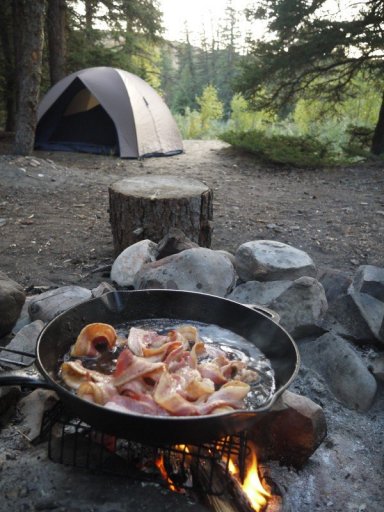We all enjoy getting out in to nature, and having adventures. When we are pursuing our adventures, it is important to remember we are guests, visiting these wild places. I hope to share some time proven strategies to increase your safety, when you have rare encounters with potentially dangerous animals.
A good policy, when in wild places, is not to surprise the animals. Let them know you are in the area. Travel in groups, the larger the better. It is OK to talk, laugh, or even sing loudly. Be observant, plug in to your environment, not to your iPod.
Bear
View attachment 30914
The good news, is that we know a lot more about bears, then we do Cougars. The bad news, is there isn’t as much consistency with Bears. I would recommend reading NOLS publication “Bear Essentials”. National Outdoor Leadership School (NOLS) publishes lots of good information for people that want to enjoy wild places.
Encountering bears is more common than many other animals. Some bears have become food conditioned and habituated. These bears are often referred to as nuisance bears, because they have learned to associate people with food. Often this forces authorities to kill the bear, to prevent potential loss of human life. These bears are far the most dangerous bear you are likely to encounter. These bears are actively searching out humans, and can get very aggressive. Keep a clean camp, and don’t accidently feed bears by leaving food behind. Practice Tread Lightly principles, and carry everything out, that is carried in. I bear that feeds on human food, is a dead Bear.
Bears have an incredible sense of smell. This is their primary sense used for locating food. Food storage is very important in bear country. Good information is available at the discussion at:
https://overlandbound.com/forums/threads/where-do-you-store-your-food-is-it-safe-to-store-it-in-the-car.5722/ I will not revisit this topic. I only want to add, that anything with a sent will attract bears. Not only food, but cosmetics such as: soap, woman’s makeup, and aftershave. These should be treated like food, with all the same precautions.
If you see a bear at a distance, these are some good ruled to follow for Viewing Etiquette:
- Respect a bear's space. Binoculars and spotting scopes allow you to view bears without getting too close.
- Never approach, crowd, pursue, or displace bears. If a bear changes its behavior because of your presence, you are too close!
- Stay in groups and minimize noise and movement. However, in areas of low visibility or when you're out on the trail, reduce chances of surprise encounters by staying alert and talking calmly to identify yourself as a human, not another animal.
- Stay on designated trails whenever possible.
- Leave "orphaned" or sick bears alone. Young animals that appear alone usually have a mother waiting nearby. Never get between a mother and her cub.
- Leave pets at home: Our pets can be troublesome around bears. At times, a barking dog can induce a fight instinct in Bears.
- Let bears eat their natural foods. Do not feed the bears
- You are responsible for your safety and the safety of wildlife. If a bear approaches you, it is your responsibility to move away and maintain a safe distance.
Once a bear has noticed you and is paying attention to you, additional strategies can help prevent the situation from escalating.
- Identify yourself by talking calmly so the bear knows you are a human and not a prey animal. Remain still; stand your ground but slowly wave your arms. Help the bear recognize you as a human. It may come closer or stand on its hind legs to get a better look or smell. A standing bear is usually curious, not threatening.
- Stay calm and remember that most bears do not want to attack you; they usually just want to be left alone. Bears may bluff their way out of an encounter by charging and then turning away at the last second. Bears may also react defensively by woofing, yawning, salivating, growling, snapping their jaws, and laying their ears back. Continue to talk to the bear in low tones; this will help you stay calmer, and it won't be threatening to the bear. A scream or sudden movement may trigger an attack. Never imitate bear sounds or make a high-pitched squeal.
- Pick up small children immediately.
- Hike and travel in groups. Groups of people are usually noisier and smellier than a single person. Therefore, bears often become aware of groups of people at greater distances, and because of their cumulative size, groups are also intimidating to bears.
- Make yourselves look as large as possible (for example, move to higher ground).
- Do NOT allow the bear access to your food. Getting your food will only encourage the bear and make the problem worse for others.
- Do NOT drop your pack as it can provide protection for your back and prevent a bear from accessing your food.
- If the bear is stationary, move away slowly and sideways; this allows you to keep an eye on the bear and avoid tripping. Moving sideways is also non-threatening to bears. Do NOT run, but if the bear follows, stop and hold your ground. Bears can run as fast as a racehorse both uphill and down. Like dogs, they will chase fleeing animals. Do NOT climb a tree. Both grizzlies and black bears can climb trees.
- Leave the area or take a detour. If this is impossible, wait until the bear moves away. Always leave the bear an escape route.
- Be especially cautious if you see a female with cubs; never place yourself between a mother and her cub, and never attempt to approach them. The chances of an attack escalate greatly if she perceives you as a danger to her cubs.
Bear attacks are rare; most bears are only interested in protecting food, cubs, or their space. However, being mentally prepared can help you have the most effective reaction. Every situation is different, but below are guidelines on how brown bear attacks can differ from black bear attacks. Help protect others by reporting all bear incidents to a park ranger immediately. Above all, keep your distance from bears!
- Brown/Grizzly/Kodiac Bears: If you are attacked by a brown/grizzly/kodiac bear PLAY DEAD. Lay flat on your stomach with your hands clasped behind your neck. Spread your legs to make it harder for the bear to turn you over. Remain still until the bear leaves the area. Fighting back usually increases the intensity of such attacks. However, if the attack persists for longer than a few seconds, fight back vigorously. Use whatever you have at hand to hit the bear in the face.
- Black Bears: If you are attacked by a black bear, DO NOT PLAY DEAD. Try to escape to a secure place such as your rig. If escape is not possible, try to fight back using any object available. Concentrate your kicks and blows on the bear's face and muzzle.
If any bear attacks you in your tent, or stalks you and then attacks,
DO NOT PLAY DEAD —fight back! This kind of attack is very rare, but can be serious because it often means the bear is looking for food and sees you as prey.
Bear pepper spray can be an important thing to carry when exploring the back country. It is used defensively to stop an aggressive, charging, or attacking bear. Although it’s used in the same manner you would use mace on an attacking person, bear pepper spray and human pepper spray are not the same. Make sure you select an EPA approved product that is specifically designed to stop aggressive bears. It is not a repellent so do not apply to your body or equipment











